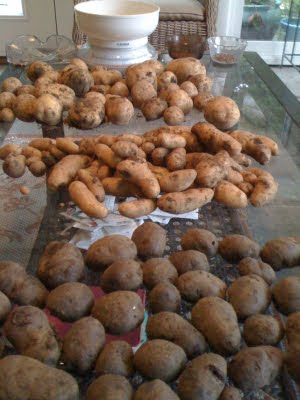Ah, potatoes! The ultimate subsistence crop. One should be able to throw seed potatoes into a furrow in spring and harvest pounds of these things in the fall. Or so one would believe. I had fantasies of coming into the house with a bushel basket full of potatoes (I don't own a bushel basket, by the way) and hearing Mr. FC&G exclaim with pride over my ability to balance the food budget with my savvy potato-growing abilities.
This, alas, did not quite happen, although Mr. FC&G did an admirable job of exclaiming over the potatoes while he helped me dig. I will take suggestions on any way to stop myself from these fantasies of homemaking run amok.
After a spring spent worrying about my potatoes, the crop grew well all season -- as much as I could tell, given the fact that they grow underground and all. The plants sure looked healthy, anyway. But when we harvested, I had a market basket full, but not really a bushel basket.
Part of this was due to the varieties I grew, I am certain. I grew Yukon Gold, which is a fairly large and heavy potato, but the Blue and the Fingerling are small and light. Ironically, some of the heaviest-cropping potatoes came from plants that sprung from store-bought Yukon Golds that went bad in the potato bin, and which I shoved in the ground rather than the compost pile. Don't let anyone tell you that a potato plant will only grow from a seed potato (see the below lessons learned). After all, didn't we all grow potato plants in elementary school by cutting them in half and suspending them in jars of water until we had roots and vines? (This may account for my lifelong over-sensitivity to the smell of rotting potatoes. By the time 30 kids had suspended potatoes in jars of water on a classroom windowsill for a month, it made for quite an olfactory impression!)
And then, dear readers, I engaged on a month-long search for a comparable price for potatoes. I found Fingerlings at the grocery for $2.19 a pound, but they were not organic. I couldn't find Blue potatoes at all, except as part of a mix. I did find a small bag of non-organic Blue potatoes in Key West, but that hardly seems like a good place to get a price for comparing to an Ohio garden. Finally, I found organic, local Fingerlings at the farmers' market for $5 a pound. There were no Yukon Golds there, and no Blue potatoes. Nonetheless, that is the price I am using for comparison.
Our crop came in as follows:
- Fingerling: 3 pounds, 5 ounces
- Blue: 3 pounds, 6 ounces
- Yukon Gold: 6 pounds, 3 ounces
But wait! I spent $56 on seed potatoes, so I am actually in the hole (potato pun!) by $6.63. I do still have a plant out there that might give me some more potatoes, but not over a pound worth unless some of my scrap potatoes, which I replanted, sprout and give me a fall crop. It pains me to add this to the tally because I will be showing a net loss. I know how much produce I've been harvesting lately, so I know I'm showing a major profit in zucchini, butternut squash, cucumbers, and tomatoes, but those crops aren't finished yet so I can't tally them.
Lessons learned?
- First, I must come up with a cheaper source of seed potatoes. I have my eye on one provider that is less expensive.
- Second, I will only be buying seed potatoes for the rare Blue potato crop. I will not grow Fingerlings. For the Yukon Golds, I plan to buy a bag of organic ones at the store (the non-organic ones are coated with a chemical to keep them from sprouting -- think about that the next time you make a potato purchase) and let them sprout. Obviously, any potato in this house that shows any sign of sprouting at any time of the year will be unceremoniously shoved in the ground as long as the soil is workable. Can't hurt, might help.
- However, finally, it seems worth it to grow potatoes if only for the availability of the specialty kinds you like. If I wanted Blue potatoes for a dish right now, I would be out of luck unless I grew them. Luckily, I have a box full down in my cool lower level room.

Very interesting and very informative. But at least a bit of a profit and nice potatoes.
ReplyDeleteWell done.